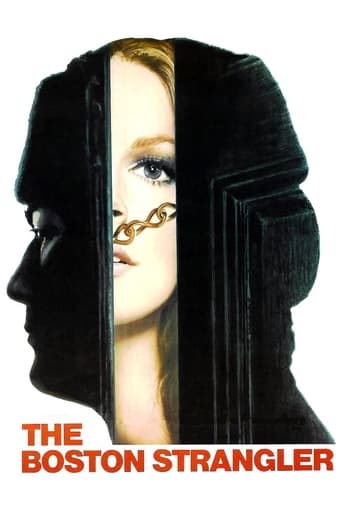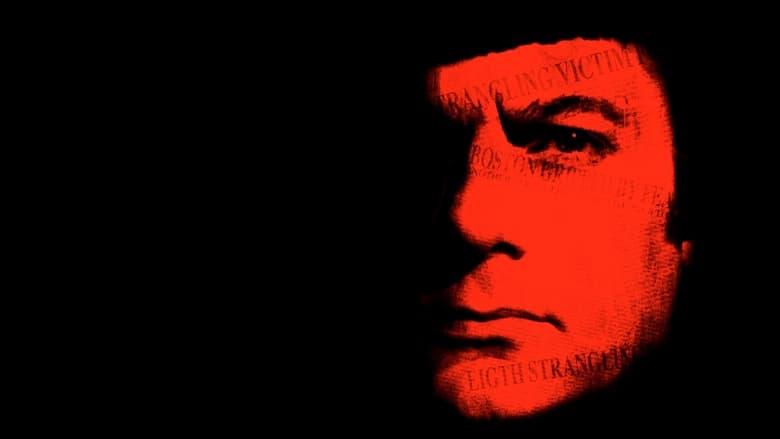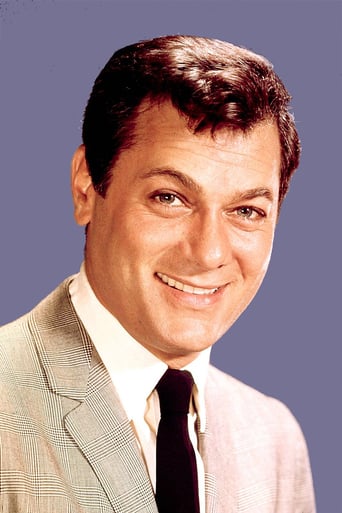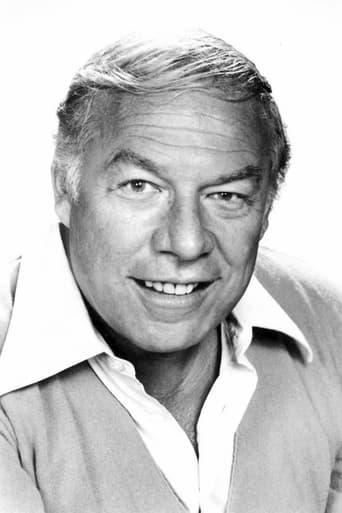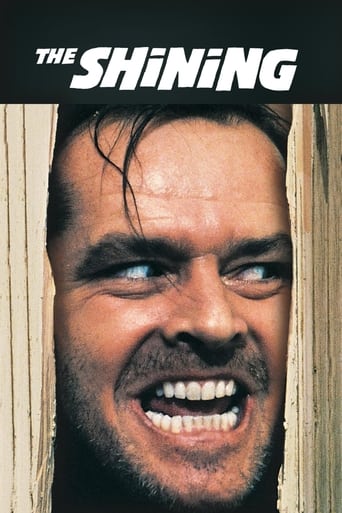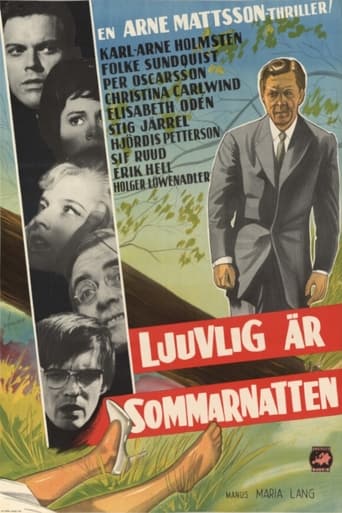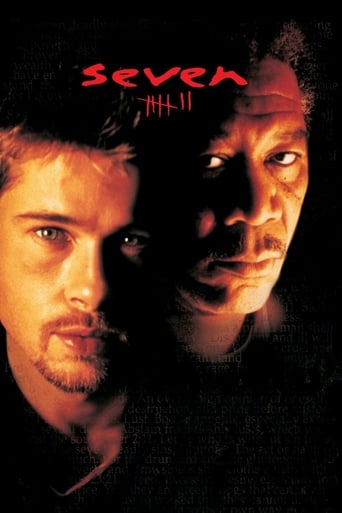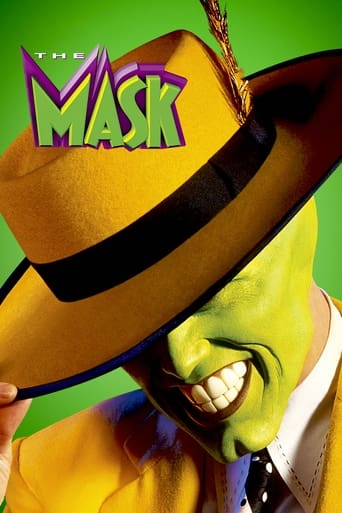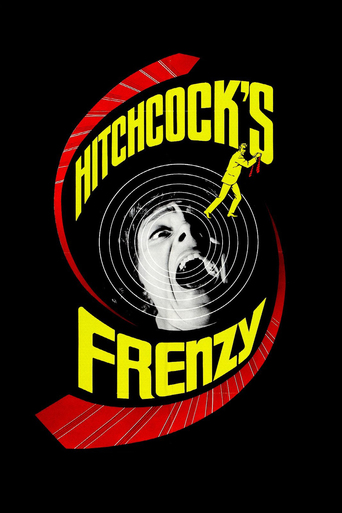The Boston Strangler (1968)
Boston is being terrorized by a series of seemingly random murders of women. Based on the true story, the film follows the investigators path through several leads before introducing the Strangler as a character. It is seen almost exclusively from the point of view of the investigators who have very few clues to build a case upon.
Watch Trailer
Free Trial Channels
Cast


Similar titles
Reviews
A different way of telling a story
A film with more than the usual spoiler issues. Talking about it in any detail feels akin to handing you a gift-wrapped present and saying, "I hope you like it -- It's a thriller about a diabolical secret experiment."
A great movie, one of the best of this year. There was a bit of confusion at one point in the plot, but nothing serious.
The thing I enjoyed most about the film is the fact that it doesn't shy away from being a super-sized-cliche;
The Boston Strangler was perhaps one of the most dangerous serial killers in American history. The Boston Strangler stars Tony Curtis in a career best performance as Albert DeSalvo and co-stars Henry Fonda as John S. Bottomly, and George Kennedy as Detective Phil DiNatale. All the acting performances are wonderful but the performance by Tony Curtis stands out.One thing that a lot of people do not like about the film is the split screen camera that is present in this film. There are times where they show for example DeSalvo knocking on the door on the left side then on the right side they show a woman reacting to the door being knocked on. This is not distracting but it starts to get distracting when four or five different images are being shown because it is hard to concentrate on all of them at once.This is a great film for anybody that are fans of Curtis, Fonda, or Kennedy, or a great film for anybody interested in serial killer biographies. However I wished there was more. It felt as if the film were missing something. After watching this film, you can assume that DeSalvo was guilty but he was never tried for the murders nor imprisoned for the Boston Strangler murders. I wish this film mentioned The "Green Man" rapes, which DeSalvo was actually sentenced to life in prison for. All in all this was a great film and I enjoyed it. The portrayal of Albert DeSalvo by Tony Curtis is not one that you will want to miss if you are a fan of him. It is a career performance and deserves recognition that he didn't get. I encourage you to see this film!
THE BOSTON STRANGLER tells the true-life story of a serial killer who terrorised the women of Boston, Massachusetts, in the early 1960s. I came to this film as somebody totally unaware of the facts surrounding the case, so watching the story unfold and develop made for an interesting film. My only complaint really is with the style; director Richard Fleischer insists on using various split-screen techniques to tell his story, and I think they detract from it.This isn't just brief, de Palma-level split screen; the entire film is full of shots which roll on and off the screen, and are manipulated in various ways. To be honest, it's fairly distracting, and comes across as dated more than anything else; I get the impression that split-screen was a bit of a fad, and I'm happy it hasn't taken off to a great degree.Otherwise, the movie is a mixed bag. Casting pretty boy Tony Curtis as the killer was a good stroke, as the star acquits himself well with the role, while Henry Fonda and George Kennedy are fine as the dogged cops on his tail. However, it's fair to say that this film is a bit overlong, with over an hour before we get to meet the killer himself. It becomes more interesting towards the end, when it takes more of a psychological approach to the proceedings, but it's never electrifying in the same way the likes of SILENCE OF THE LAMBS were electrifying. An interesting curio, then.
A Split Screen presentation of the Pursuit of a Killer with a Split Personality. This Tense, Riveting expose was one of the First Films to deal with Sexual Perversion with Stark, Realistic Dialog and the Aftermath of these Type of Crimes.However, the Movie Suffers in the Third Act when Abruptly, the Focus Turns from Apprehension of the Strangler to the Mental Health Diagnosis of the Suspect. The Talky, Clinical Conclusion might be the Politically Correct, Technically Correct way to Deal with the Subject, but, for the Cinema it is a Killer.A lot has been said of Tony Curtis Playing Against Type but the Allotted Screen Time is Not Enough to Provide any Depth or Explore any of the Contradictions of the Character. The Screenplay seems Unable or Unwilling to Go There. Once the Murderer is On Screen it all seems Rushed and rather Detached. Given that the Boston Strangler and not the Police Investigation Screams to be the Focus of the Film.
The Boston Strangler nestles nicely into a small canon of films of around about the time it was made looking at the notion of a pathological killer as an example of an immensely disturbed person, with an unbalanced psychosis, rather than a mere monster of an uncanny variety killing because it's apparently in their primal nature. Like Hitchcock's Psycho eight years before it, Richard Fleischer's The Boston Strangler is a serial killer film about such a person living locally; living normally or even, as the saying goes, "living next door". The film is a scary and unnerving ride at the best of times, an attempt at a police procedural thriller on top of a disturbing tale of a man already under and on his way further down. Like Hitchock's masterful work before it, the film takes its cue from a true to life tale; but where Psycho was, we're told, inspired by the events of a certain Ed Gein, Fleischer's work here is more an authentic retelling of a true story – a feeding off of the real case of a certain Albert DeSalvo whom molested and strangling women of varying ages during the 1960s within the titular Massachusetts city. Furthermore in addition to Psycho, the film is particularly interested in the notion of duality or the item of dual personas within somebody and while it doesn't hit the levels Psycho did in its thriller sub-genre roots, The Boston Strangler is a substantial and interesting enough piece of work by itself.The film begins with somewhat of a national celebration of some astronauts whom have returned to Earth and have been granted a parade, an item of national pride or celebration of achievement which is eerily inter-cut with a break in at an apartment which comes with a sordid murder of a woman as well. The sequence sees the film highlighting a nation's want or lust to progress scientifically, as experimentations in space travel appear to unfold with rapturous enthusiasm without realising there are certain other fields, namely human psychology, more closer to home that need just as much exploration; attention and breaking through of – the science of what's going on 'down here' highlighted as just as important as the science in trying to advance 'up there'. Several more murders happen, the film going onto document a state's ill informed reaction to such things by rounding up crooks; freaks; fetishists; ex-cons; homosexuals and other people of a generally 'ill' or unbalanced ilk. An emphasis on one of these sorts of people surely guilty of the on-going murders is established, the film's thesis coming to highlight the incorrect assumption past ideals might have resembled.The guilty party on this occasion is the late Tony Curtis' DeSalvo, a performance which has gone grossly understated as the years have rolled past, a man whom when we first observe him sits at home in a seemingly idyllic set-up with his family. His two kids play while the television is on, his wife works the kitchen over and he reads law rather than car or gun magazines like the other suspects whom were rounded up. The film bypasses most of DeSalvo's past, namely his childhood, and grants him this setup; but it is not the setup a man of DeSalvo's upbringing would have easily attained. Moreso, the film is not interested in how the killer came to be who he is, but exactly what it is that he is. Most of the murders he commits are unfolded with a split screen technique, something that shows various stages of the attack and the parties involved in the various locations those involved inhabit; that sense of distortion or a fragmented mindset via the visuals is certainly prominent, something that works well when later reveals of Albert's inability to suppress his I.D are unfolded and more than one persona raging around inside of him is explored.If the film has any kind of flailing, it's that it isn't interested in the police procedural content as much as it is the points or notions of exploration in regards to DeSalvo. George Kennedy's detective Phil DiNatale takes on the case after an entirely separate bureau is established to deal with the problem, again exploring the breakthroughs and ever-shifting actions within the field of investigation people were forced into taking so as to deal with this kind of problem: the 'straight' killer, while Henry Fonda's role as detective John Bottomly sees him partake in nothing much-bar merely tag along for the ride. These characters are archetypal, stiff and bog the film down with its having them visit one too many suspects as well as over indulge them in the drawn out documenting on future plans of action. Since it isn't as interested in them as much it is DeSalvo; the substance that comes with him and the highly effective manner in which it documents his killings, we ourselves are not as interested in them. Fleischer, feeding off of an Edward Anhalt screenplay further still feeding off of both a novel and a true to life event, directs well in the scenes where his priorities lie; the studying of DeSalvo as this monster living amidst the 'normalised' explored interestingly enough whilst the whole thing comes to climax with a harrowing self-exploratory reveal that is quite powerful.

